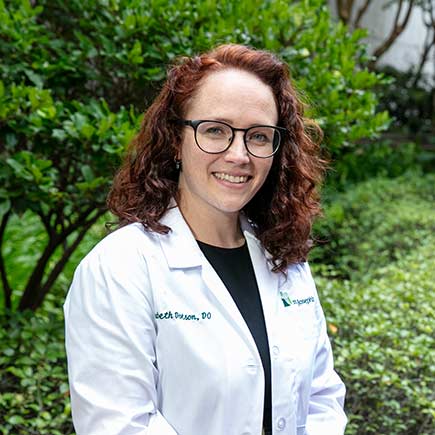

Elizabeth Dotson, D.O.
Specialty: Gynecology
Subspecialty: Urogynecology
Office Location:
St. Joseph’s/Candler Physician Network – Progressive GYN
5353 Reynolds Street, Suite 201
Savannah, Ga. 31405
912-355-5755
Request an appointment
Education:
Bachelor’s Degree: Roanoke College, Salem Va.
Post-Baccalaureate Pre-Medical Program: University of Virginia, Charlottesville, Va.
Doctor of Osteopathic Medicine: West Virginia School of Osteopathic Medicine, Lewisburg, W.Va.
Obstetrics & Gynecology Residency: University of Virginia Health System
Clinical Research Fellow in Urogynecology and Reconstructive Pelvic Surgery: Massachusetts General Hospital/Harvard Medical School, Boston, Mass.
Savannah Urogynecologist Dr. Elizabeth Dotson encourages women to be open with their providers as they go through the changes that come with aging
SJ/C: Why did you decide to become a doctor?
I was lucky to grow up in a medical family – my father was an OB/GYN in a small community in Virginia and my mother was an ER nurse – and I got to see how rewarding it was to interact with patients on a personal level and really support patients through whatever they are dealing with in their life. That’s what drew me to go back to school and go into medicine.
SJ/C: What made you choose this specialty?
There’s a special relationship that an OB/GYN has with patients during pregnancy and delivery, but what drew me to urogynecology are the changes and milestones that occur throughout an entire woman’s life – perimenopause, menopause, complications that women deal with after childbirth. Much of urogynecology focuses on getting women back to their normal, comfortable lifestyle. Being able to help women through the changes that come over the decades is really rewarding.
SJ/C: What are some common conditions you treat?
The primary conditions I treat are pelvic organ prolapse, urinary incontinence, overactive bladder syndrome, fecal incontinence, fistulas of the genital tract and recurrent UTIs. I am able to offer both traditional laparoscopic surgery or robotic surgery with the da Vinci system, as well as vaginal surgery.
SJ/C: Where do you think the future of this field is going?
Urogynecology is a relatively new subspecialty of OB/GYN and is becoming better known as the public in general becomes more comfortable talking about these issues. Prolapse and incontinence were once conditions that women assumed they just had to live with. Many women wouldn’t even mention these problems to their physician. Over the next several decades I expect that the demand for care from urogynecologists is going to significantly increase now that we are seeing more dialogue about these problems. With increased demand, I suspect that our surgical techniques and tools will continue to advance. It’s exciting to see women are seeking out care for these conditions.
SJ/C: What would you say to encourage women to be open and honest and not embarrassed to talk to their provider about any problems they may be having?
First, remember that you don’t have to live with these kinds of problems. Women’s bodies go through so much over the decades – from pregnancy to menopause – and there are significant changes that come with age. Also, these conditions are far more common than you probably realize. Many of your friends, your mothers, aunts and grandmothers likely experienced these same problems – they just didn’t talk about it.
One of the most rewarding aspects of urogynecology is that we help women get back to their normal lifestyle. Prolapse and incontinence often prevent women from doing things they love to do every day. If I can get someone back to exercising, enjoying a meal at a restaurant with their friends or being able to go to the movies again that is so rewarding to me.
SJ/C: What is some common advice you find yourself sharing with patients for overall general wellbeing?
Dealing with the changes that a woman’s body experiences after pregnancy and menopause can feel overwhelming. It can seem like a daunting hill to climb to feel like your “normal self” again. I like to remind my patients that it’s often the small changes that you’re able to maintain in the long-term that can help you feel better. Most important is to not be afraid to bring up your concerns with your physician. There are many options for tackling problems like prolapse or incontinence, so we are often able to find solutions that work for you and your stage of life.
Family: Husband, Jordan, and 17-month-old daughter, Dottie
Hobbies/Interests: Cooking, getting outside, going to the beach
